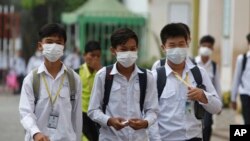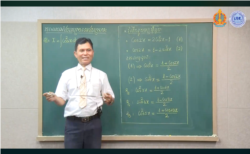Weeks before the national high school examinations, students would have likely been poring over their textbooks, revising lessons, and meeting with teachers and classmates to prepare for the important test ahead.
That is not the case this year because students are still unaware of when these examinations will be held, which are usually conducted in late July or early August. As the number of novel coronavirus cases increased in Cambodia, the Education Ministry decided to close schools indefinitely on March 14, to prevent the spread of the virus, which has so far resulted in 141 positive cases and zero deaths.
VOA Khmer spoke to students that are nonetheless moving ahead with their preparations for the annual test. They are busy flicking between Telegram groups and Zoom calls, discussing their notes with friends and attempting to understand the syllabus.
In recent weeks, the government has put off reopening schools, leaving students to make do with makeshift online classes as the only way to prepare for the yet-be-scheduled examination. The Education Ministry said it was unsure when to conduct the examination, but had indicated that it will be an online test.
Heng Seng Hout, a grade 12 student at Preah Yukunthor High School in Phnom Penh, has always dreamed of becoming a doctor. Since the school closures, he has been studying with the E-School Cambodia smartphone application, which is a privately-owned application that cooperates with the Education Ministry. It is meant for students in secondary and high school.
Studying with the application had made it much harder to absorb the lessons, Heng Seng Huot said. He was unable focus on instructions given by teachers in the videos on the application, often learning little to nothing from the session.
“When I study with my teachers in person, it's one way of teaching [that works],” he said. “When I study with other teachers online through an e-learning app, it's a totally different method. Sometimes I just don't understand.”
The Education Ministry has said it been unable to fully meet the demands on online pedagogy, especially in the provinces. It has instead looked to ease this transition to online learning by producing videos of classroom sessions for students to view on local television or through livestreams on social media platforms.
Heng Seng Hout said these videos were not sufficient to understand grade-12 lessons, which are often complicated and require one-on-one explanation from a teacher to comprehend. Given these obstacles, the high school student wants the government to delay the exams for now.
“For me, I feel concerned as the national exam approaches because we haven't studied well enough,” he said.
Over in Kandal province, Khat Sreyna, another 12th grader at Serei Mongkol High School Mukh Kampul District, is dealing with a slightly different approach to teaching amid a pandemic.
At her school, teachers have been using conference call service Zoom to teach mathematics, but for every other subject they are only given exercise sheets.
Khat Sreyna was unsure why other teachers did not use Zoom or similar video conferencing applications to teach students, presuming that they too did not have the necessary equipment or training for an online pedagogy.
The lack of interaction with teachers and the delay in getting a teacher to reply to a query was frustrating, Khat Sreyna said, and there was a lot she was not understanding.
“It's hard to know talk about [the exams]...because there are many hard concepts to fully understand,” said the 18-year-old high schooler.
Khat Sreyna is also concerned for some of her friends, who might struggle without in-person teaching. She said they were unable to grasp the curriculum in the current situation.
“I think that [online learning] can help only some students because honestly speaking even in school, where the teachers are strict, there are those who still didn't fare well,” Khat Sreyna said.
Ros Soveacha, a spokesperson at the Ministry of Education, acknowledged the problems associated with online or distance learning. However, his solution for students was to watch the televised broadcasts of daily classes at a neighbor’s home, if they couldn’t afford a smartphone.
“For students who can't afford smartphones, the [Education Ministry] encourages them to watch TVK 2, which is a channel broadcasting teaching material, at their neighbor's homes for now,” he said.
The spokesperson also appealed to teachers to work closely with students under their supervision to ease any issues faced by online learning.
VOA Khmer spoke to teachers who said it was challenging to teach in the current environment and that there was little time to perfect these new teaching methods, referring to the streaming of educational content on TV or the use of social media to organize classrooms.
Touch Rathany, a mathematics teacher at Preah Kossamak High School in Kratie province, has witnessed how socio-economic inequities were hampering online teaching.
Many of the poorer students were unable to partake in any learning that required expensive smartphones or internet data, with others unable to decipher Grade-12 concepts through self-study, he said.
The mathematics teacher decided to help his students by creating YouTube videos, where he would explain complex subjects and provide instructions for their homework. These seemed to be working, he said, but that teachers in the school did not have the equipment or training required to frequently produce these videos.
“I have had some problems creating these videos,” he said. “We lack technical equipment to do this. The ministry has their own equipment, but for us it's a bit difficult.”
The 30-year veteran of the education system was worried about his students’ prospects at the national examination, acknowledging that teachers were also constrained from providing the necessary assistance during this stressful period.
“According to my observation, I think that they might not do so well,” Touch Rathany said. “It is not like in class where we can teach them directly. Learning from a distance, it's a bit hard for us [teachers] as well.”
For private school students, the situation might be a little better, but they share the same concerns of being underprepared for the critical examination.
Where public school students have little facetime with their teachers, Ly Lyhour, who studies at Beltei International School in Phnom Penh, has video and online classes on Telegram and Zoom for all subjects, except for English language.
The 12th grader has classes every morning, from 7:30am to 11am, five days a week. But, even with better access to online teaching resources, Ly Lyhour is apprehensive of her performance at the national examination, whenever it is conducted.
The high school students admited that she was struggling with Khmer literature subject, even before the pandemic caused schools to close. But, now she doesn’t have teachers to help with the lessons and she needed some personal attention from her teachers to do well in the national test.
“At I first, I seemed to have high hopes because in the first semester I did rather well since I got to study with the teachers and we understood the lessons well,” she said.
“Now that we can't go to study, things have become not so fruitful for us.”







